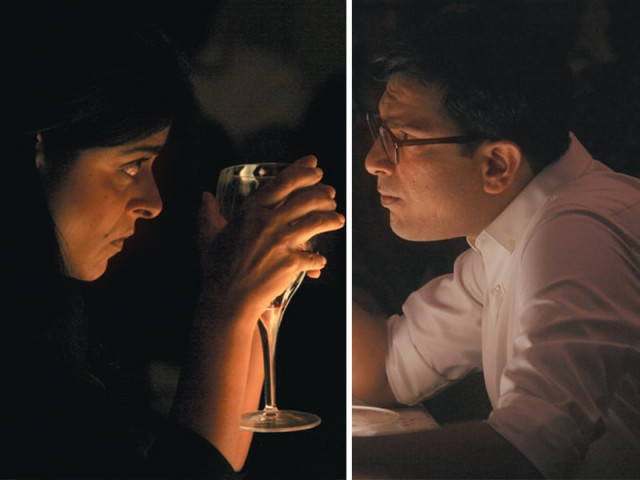Shoot/Get treasure/Repeat: Using war to achieve love, peace, security
Channan Productions’ rendition of Ravenhill’s plays based on war moves the audience at T2F.

The play ‘Fear and Misery’ dealt with the lives of a married couple. PHOTOS: ATHAR KHAN/EXPRESS
The directors/actors, certainly lived up to their reputation - brilliant dialogues, combined with class acting. “The idea was to produce a play that was both relatable and relevant,” Khoosat told The Express Tribune.
Although he was skeptical of the salty language in the original play, the two directors decided not to alter much of the content. They chose The Second Floor cafe as the venue because it gave a feeling of being “a home production, rather than an industrial venture”.
The first play ‘Fear and Misery’ started off with the scene of a dinner table conversation between a married couple. The wife, played by Nimra Bucha, expresses her insecurities, about her husband’s behaviour in private moments, casting doubt over the time when their child was conceived. The short play starts off slowly, gradually picking up momentum as the husband and wife argue over petty issues. The only thing that they can presumably agree upon is the need to ensure their child’s safety, “the need to keep Alex [the son], away from the harsh world, the addicts, the bombings and the headless soldier,” who is a character of the child’s dreams.
The second play ‘Peace and War’ captures a scene from the dreams of 11-year-old Alex [Channan Hanif], who is in conversation with a headless soldier [Adnan Jaffer]. The soldier is upset that he has lost his head after which the world has shunned him. At times, the soldier portrays wars as the only aim in his life. “Humans can live without family and love, but never without war,” he claims. Yet, he envies the 11-year-old child for his “perfection,” and in a symbolic gesture, asks him for his head so he too can lead a normal life.
The third play ‘Crime and Punishment’ is perhaps the best out of the three, due to Bucha’s splendid performance. Khoosat, a soldier, is interviewing a detained Middle-Eastern woman, Bucha, one of the campaigners who demanded Western intervention to overthrow the dictator and bring in a democratic government.
In a dramatic twist, the soldier asks the woman to love him. He reminds her that he came all the way when she had called for his help. “We are all broken people, in need of love,” he says. When she refuses, he becomes frustrated and kills her by cutting her tongue. The play ends with his monologue: “I’ve decided there’s no love in this world ... I’m going to shoot myself. Or maybe I should just invade somewhere else to find love.”
The performance ended with a standing ovation from the audience, moved as much by the content of the plays as the rendition of the characters. “For me, it was very satisfying,” Sarmad told The Express Tribune, after the play. “It wasn’t just this play,” he said. “I have always wanted to experiment with and encourage new genres in Pakistani theatre.”
Sarmad felt that theatre in Pakistan is mainly focused on contemporary gallery style productions. “I hope the future holds a better chance for more unorthodox genres in theatre, where two people can just decide to perform and go ahead and do it, much like this play.”
Published in The Express Tribune, April 20th, 2013.



















COMMENTS
Comments are moderated and generally will be posted if they are on-topic and not abusive.
For more information, please see our Comments FAQ